No, it is not a good idea to keep a wild pigeon as a pet, as this would be a cruel thing to do.
You will be removing it from its home, its mate, and maybe any babies that the pigeon is trying to care for.
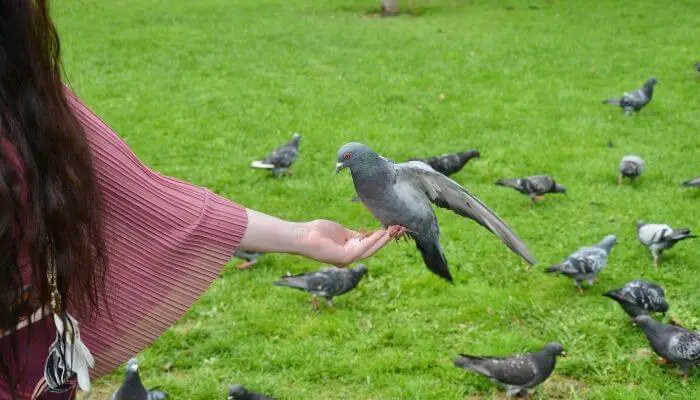
If you try to catch a wild pigeon, it can create a lot of stress for the bird and it may have a stroke or a heart attack from the shock.
The pigeon may also get hurt while trying to get away from you.
There are some very good reasons to not have a wild pigeon as a pet.
1. It’s A Big Commitment
Bear in mind that a wild pigeon’s lifespan is only 3-6 years but they have been known to live for 10 years in captivity. A racing or pet pigeon can live for 9-15 years, but some have lived longer than 20 years.
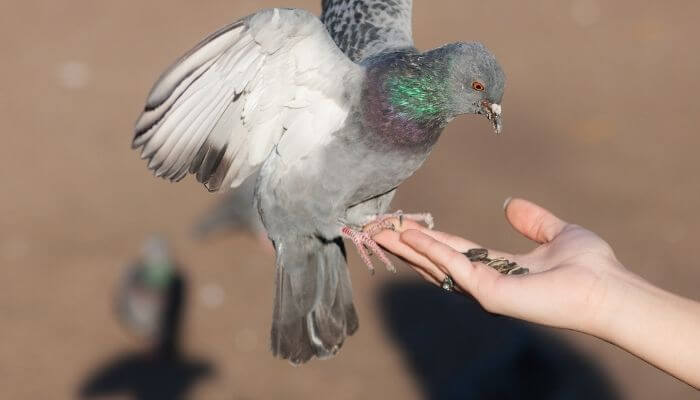
If you take on a wild pigeon as a pet, you need to be prepared to look after it for up to 10 years.
Another consideration is that pigeons are social animals and they will become lonely if they are just kept in a cage all day on their own, so be prepared for an unhappy bird.
2. Feral Pigeons Are Unhealthy
One of the main reasons not to catch or have a wild pigeon as a pet is because it may have any of the common pigeon diseases.
Do not be mistaken, the idea that pigeons are flying rats full of disease is completely untrue. However, like all wildlife, you cannot rule out them having some kind of disease.
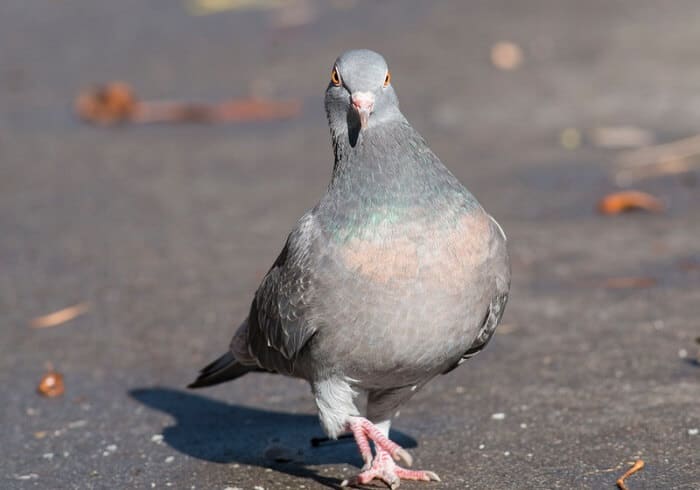
Some pigeon diseases are zoonotic, so not only is there a chance that introducing a wild pigeon to your home can put other birds and pets at risk but there is also a risk to you.
A similar downside if you catch a wild pigeon is that you don’t know where it has been, so you will need to check it for ectoparasites.
They are pigeon lice and they are transferable to most household pets and many types of fabric.
If the bird does end up having lice and you have been keeping it with a group of other pigeons, you will need to de-lice all the birds, just as you would when if your child had head lice.
The lice can move from one pigeon to another, they lay the eggs between the pigeon’s feathers, the eggs will hatch within 2-3 days, and once hatch they can live up to 2-3 months if not treated.
3. Hand Rearing
If you have acquired a baby wild pigeon, you may end up having to hand-rear the bird.
The mother may have been killed or a baby may get kicked out of the nest because it is the runt and the mother thinks it won’t survive.
You will have to hand feed the baby by purchasing formula powder that mimics the crop milk that the parents would normally feed the baby.
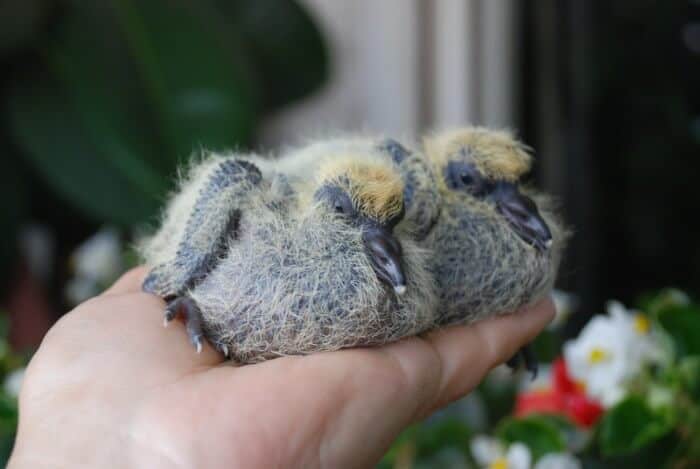
You can buy the milk from your local vets or from a pet store. You can find it online too.
Doing this will take a lot of your time because the bird will need regular feeding and tending every few hours for the first 20 to 25 days, after which time it will no longer require your help.
4. Legal Issues
A wild pigeon may fall under legal process depending on your country of residence.
It is legal to keep wild birds as pets in all English-speaking countries, but you will need to follow the rules and regulations before you can do this.
Such as you will need to have a license to keep several types of birds and remember that any endangered birds need to be donated to suitable zoos because it is against the law to keep them.
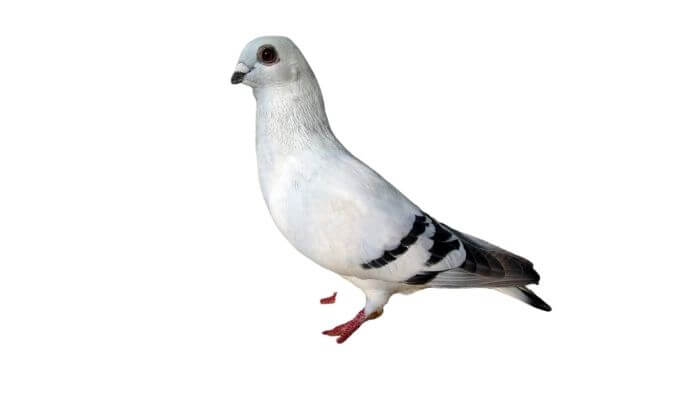
Do not buy birds with the notion of setting them free once they have grown up, as they will not be able to look after themselves out in the wild.
To keep certain wild birds you do not need a license, but you will need to prove that it is owned by you legally if you ever create a report to the police.
For example, if somebody killed your bird and you want to prosecute, you should keep notes of where it was taken, a receipt of where you purchased it, or where you found it. In short, you will need to prove that the wild bird was somehow yours.
5. Housing Rules and Regulations
If you live in certain buildings or rented accommodation, you may need to seek advice on your new pet.
A wild animal being kept in captivity is often cruel, and most people won’t take kindly to it.
Also, landlords may report you if they think you are capturing wildlife.
Just make sure that you seek the right permissions from the right people before you start keeping a new pet.
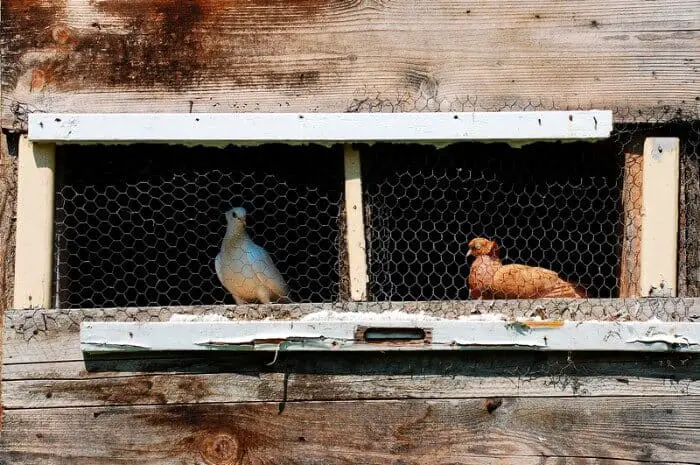
Pigeon poop is another problem that you will need to deal with, as you can’t train them to go in a certain area.
If let out around your area they will poop in the garden, on the car, on any statues they find and they may cause a nuisance to your neighbors too.
Wild birds are often a little messier than domestic pigeons, but it may be a matter of personality over how domesticated they are.
You will need to provide your wild pigeon with an indoor area, and an outdoor area, such as an aviary, coop, shed, or dovecote.
6. Vet’s Bills
If the wild pigeon is injured when you catch it, vets are often trained to euthanize wild animals, which most are trained to do for free.
If you want the wild bird to be treated, you will probably have to pay over the odds to the vet.
It is not the vet being vindictive, it is based on the idea that if there were no human intervention, then a predator would have killed the bird already, ergo putting the bird to death is the most humane option.
Alternatives to Wild Pigeons
If you want to have a pigeon as a pet, one may suggest you get a fantail dove or homing pigeon, as you can train these to fly home back to the coop, fly around your estate, and you can train them to be tame with you but not with other people.
It is better if you buy pigeons in small groups so that they have company, and that you buy them young so that they may bond with you.
Other pigeons that are not wild and make good pets include king pigeons, fantails, and archangel pigeons.
